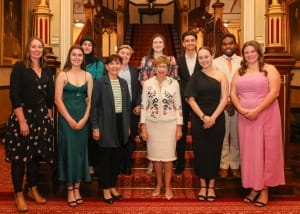
 The eighth in the series of Ideas@theHouse events — joint presentations of Her Excellency the Honourable Margaret Beazley AC QC, Governor of New South Wales, and the Royal Society of New South Wales — was held on the evening of Thursday 10 August 2023 in the Ballroom of Government House Sydney.
The eighth in the series of Ideas@theHouse events — joint presentations of Her Excellency the Honourable Margaret Beazley AC QC, Governor of New South Wales, and the Royal Society of New South Wales — was held on the evening of Thursday 10 August 2023 in the Ballroom of Government House Sydney.
Professor Emma Johnston AO FRSN FAA FTSE, Deputy Vice-Chancellor (Research) at the University of Sydney, presented “Ideas for marine stewardship and sustainability in a time of acceleration” to a face-to-face audience of approximately 100 people, which included Society members and invited guests including students from NSW universities and school teachers, together with an online audience of approximately 60 people.
In a thought-provoking talk, Professor Johnston described the key drivers of ecological acceleration, discussed how they act in concert and the implications for marine and coastal social-ecological systems, and went on to present ideas for converting vicious cycles to virtuous ones through effective environmental stewardship.
A recording of her presentation is now available on the Society’s YouTube channel and a gallery of images from that occasion is available from the preceding link.